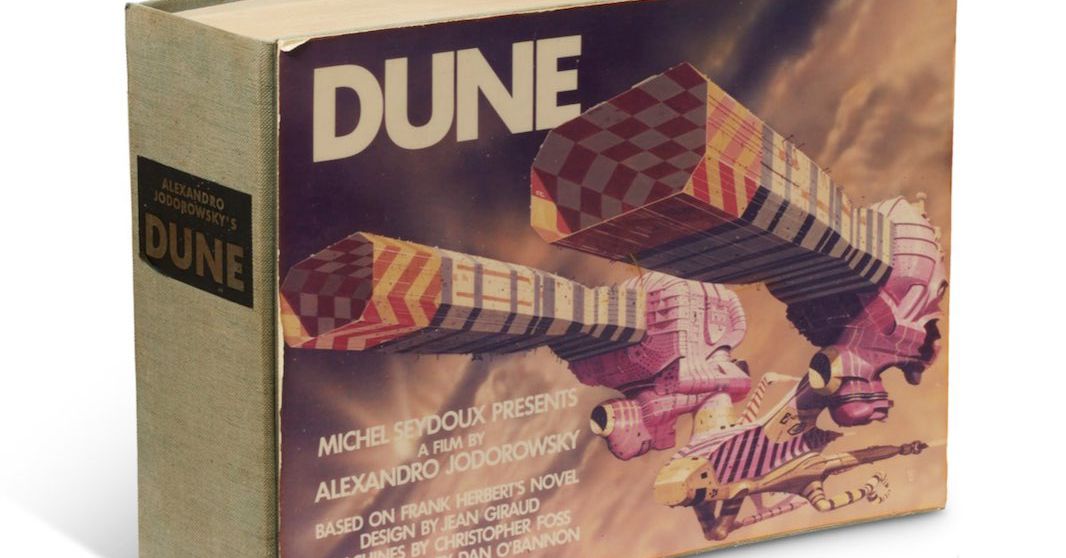Last year, a collective of cryptocurrency fans pooled millions of dollars to buy a copy of the story bible for director Alejandro Jodorowsky’s legendary never-made adaptation of the novel Dune. After winning a November auction, the group voted last week on a direction for the project and got promptly roasted online for allegedly not understanding what they’d bought. Their plans included an animated series inspired by Jodorowsky’s Dune, and as any good collector likely knows, buying a commemorative copy of a script or storyboard doesn’t give you the right to shoot your own version.
The actual situation seems more ambiguous than some critics are suggesting. The Dune story bible’s owners, known as Spice DAO (short for “decentralized autonomous organization”), appear perfectly aware they don’t own Dune itself. Instead, they’re committing to an original series “inspired by” the book. The whole scheme might help illustrate why art can’t be reduced to a neat series of copyright licenses — rather than simply showing that “crypto bros aren’t sure how rights work.”
That said, a lot of them probably aren’t.
We won the auction for €2.66M. Now our mission is to:
1. Make the book public (to the extent permitted by law)
2. Produce an original animated limited series inspired by the book and sell it to a streaming service
3. Support derivative projects from the community pic.twitter.com/g4QnF6YZBp
— Spice DAO ( , ) (@TheSpiceDAO) January 15, 2022
Spice DAO outlined its future plans in an inaugural governance proposal that was approved by 95 percent of token-holding voters. In addition to electing a four-person core management team, it commits the DAO to a set of four goals between January and March of 2022: “gain physical custody of Jodorowsky’s Dune book by arranging shipping and storage,” scan every page of the book, hire a social media agency, and “present a film treatment and budget by Roble Ridge Productions for the original animated limited series inspired by the book for a community vote.” (The series was previously announced in December.) On Twitter, Spice DAO noted that it planned to “sell it to a streaming service” in the long term.
Gizmodo, The Next Web, and some Twitter critics have interpreted this as Spice DAO believing that they’ve acquired the rights to “make their own Dune.” But as Gizmodo notes, the group has acknowledged they don’t own the intellectual property behind Dune, and the term “original” typically refers to something that’s not officially part of an existing IP franchise. In other words, it sounds like the script team wants to follow in the footsteps of Jodorowsky, who reworked several of his additions to Frank Herbert’s Dune novel into an original comic series called The Incal. As Spice DAO has put it, “while we do not own the IP to Frank Herbert’s masterpiece, we are uniquely positioned with the opportunity to create our own addition to the genre as an homage to the giants who came before us.”
Spice DAO obviously wouldn’t need to own a copy of the Dune bible to make a Dune-like series that wasn’t explicitly derived from Jodorowsky’s work. But I haven’t seen public statements indicating that the central parties involved believe otherwise. From the outside, the auction purchase looks plausibly like a publicity and funding strategy, not a botched attempt to buy a copyright. After all, anybody can write a script indirectly inspired by Jodorowsky’s Dune — if you want yours to get noticed, hooking up with a group of fans to purchase a rare collector’s item isn’t a bad gambit.
It’s unfortunately hard to tell how many people backing Spice DAO are on the same page about what they’re funding. Ryan Broderick’s Garbage Day newsletter, for instance, outlines some significant confusion around voting, copyright, and what “adapting” the script should mean.
And the DAO itself is fairly reticent to clarify what it’s making. I reached out via Twitter to ask whether the governance proposal referred to a series that was explicitly based on Dune or one that was indirectly inspired by it — and if it was the latter, whether it would still be advertised as “inspired by Jodorowsky’s Dune.” (This would almost certainly antagonize the various parties who own the Dune franchise, even if the underlying series wasn’t infringing on their copyright.)
“Why would we share with you before we share with community?”, the Twitter account responded. A followup message wasn’t answered, so it remains unclear whether the account was simply declining to comment, or whether Spice DAO community members haven’t been told definitively whether they’re getting a Dune series or simply a Dune-flavored series.
There’s a lot of real confusion over crypto and copyright, and a lot of projects are legitimately bad at explaining what crypto “ownership” gets you. You should also probably keep your expectations in check for a Spice DAO series. Making an animated miniseries is a somewhat tougher deliverable than mailing a book, and the DAO is arguably glossing over a lot of real legal challenges it would face even with an original script. A lot of intellectual property law is about might, not right — so if a bigger studio wants to shut down something that looks and sounds too much like Dune, even a careful and competent team could face a long court battle.
But lots of creative projects start with artists building on a favorite book or movie, whether or not they use systems like a DAO. Let’s not encourage the all-too-common assumption that people can only do this if they buy permission — even if the people we’re talking about are crypto bros.
Credit: Source link



















